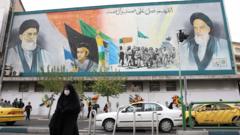As tensions continue to escalate between Iran and Israel, the decision-making process central to Ayatollah Ali Khamenei and his advisers revolves around a series of challenging options. With calls for retaliation against Israel's military strikes, Iran faces the delicate balance of demonstrating strength while fearing increased confrontation.
Shifting Sands: Iran’s Dilemma Amid Escalating Tensions with Israel

Shifting Sands: Iran’s Dilemma Amid Escalating Tensions with Israel
In the context of heightened conflict between Israel and Iran, Tehran faces pressure to respond or risk appearing weak.
The spectrum of choices available to Iran includes launching ballistic missile strikes as retaliation or opting for restraint to avoid deepening the conflict. However, failure to respond could be interpreted as weakness, especially with ongoing U.S. support for Israel. Amidst this turmoil, Iran's governmental and military leaders have issued stark warnings against aggression, reiterating their right to self-defense according to international law.
The rhetoric from Tehran has been notably defiant in the face of Israeli strikes, with officials declaring that attacks on Iran's territory will not go unanswered. Following a significant attack attributed to Israel on 1 October, which saw Iran launch extensive missile strikes in return, the situation is particularly precarious.
Israeli Prime Minister Benjamin Netanyahu's aggressive strategy hinges on undermining Iranian influence in the region, including support for Hezbollah. As Iran continues to feel pressure from escalating military actions, its strategy of utilizing regional allies may no longer suffice as a deterrent. The dynamics created by recent hostilities have left Iranian leaders grappling with whether to maintain their posture or pursue a more aggressive stance.
The backdrop of U.S. foreign policy complicates these choices; President Biden’s administration has stressed the need for restraint from both Israel and Iran. The approaching U.S. elections add another layer of complexity into the military calculations of both nations, as potential shifts in leadership could change the strategic landscape rapidly.
Amidst this clash of interests and beliefs, global diplomatic efforts may hold the key to averting a full-blown conflict. Iran might see the necessity of engaging in fresh nuclear negotiations as a way to secure a safer standing internationally while navigating this charged environment. The delicate dance between perceived strength and the stark realities of escalation continues, leaving a cloud of uncertainty hanging over the region.
The rhetoric from Tehran has been notably defiant in the face of Israeli strikes, with officials declaring that attacks on Iran's territory will not go unanswered. Following a significant attack attributed to Israel on 1 October, which saw Iran launch extensive missile strikes in return, the situation is particularly precarious.
Israeli Prime Minister Benjamin Netanyahu's aggressive strategy hinges on undermining Iranian influence in the region, including support for Hezbollah. As Iran continues to feel pressure from escalating military actions, its strategy of utilizing regional allies may no longer suffice as a deterrent. The dynamics created by recent hostilities have left Iranian leaders grappling with whether to maintain their posture or pursue a more aggressive stance.
The backdrop of U.S. foreign policy complicates these choices; President Biden’s administration has stressed the need for restraint from both Israel and Iran. The approaching U.S. elections add another layer of complexity into the military calculations of both nations, as potential shifts in leadership could change the strategic landscape rapidly.
Amidst this clash of interests and beliefs, global diplomatic efforts may hold the key to averting a full-blown conflict. Iran might see the necessity of engaging in fresh nuclear negotiations as a way to secure a safer standing internationally while navigating this charged environment. The delicate dance between perceived strength and the stark realities of escalation continues, leaving a cloud of uncertainty hanging over the region.




















